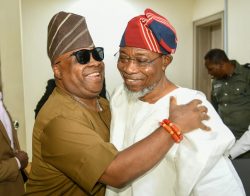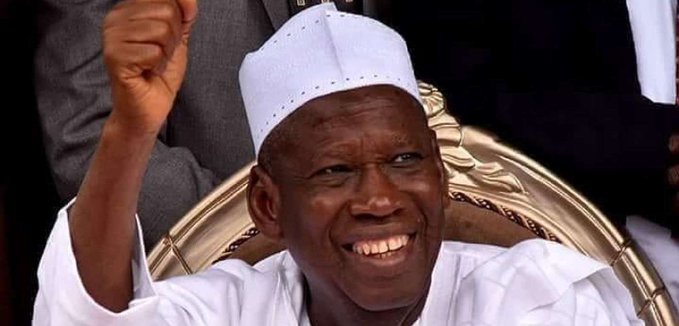Inspired by the outcome of the recent “homecoming” of Ogbeni Aregbesola to Osun, let us begin this piece spiritually. The battle between Good and Evil started even before the creation of Man. Almighty God and all His Angels were in heaven and all was well, with the angels happily, continually glorifying God. Then, one of the angels said to himself, figuratively speaking, “What the hell?” and, pursuing his own self-interests, recruited other angels to rebel against God’s will; thenceforth, the birth of Good and Evil.
The Good is easy to define: those content to do God’s will and obey His commandments – summarised in the Golden rule, which is the core preaching in all religion: do unto others as you would have them do unto you and do not unto others as you would not have them do to you. They are the Best. Evil is simply defined too: those who disagree with above, and would rather, like Lucifer their ancestor, pursue their selfish goals often detrimental to the collective good. They are the Worst. As preached by the Holy Quran, Allah has given all a field day on Earth, those who make the most effort will be granted success, whatever their choice. However, it is in heaven that He will eventually sort them out and reward each accordingly. The perplexing question is why the Best are having it rough on Earth while the Worst are having a rollercoaster?
The Best and Worst abound in Nigeria, across tribes and religions. The Worst seems to have made Politics their lucrative destination, having unlimited latitude while recruiting disciples for Hades in millions, as they suffocate the few Best. In the first paragraph of his famous apocalyptic poem “The Second Coming,” William Butler Yeats wrote, “Turning and turning in the widening gyre, the falcon cannot hear the falconer; things fall apart; the centre cannot hold; mere anarchy is loosed upon the world, the blood-dimmed tide is loosed, and everywhere the ceremony of innocence is drowned; the best lack all conviction, while the worst are full of passionate intensity.” Yeats appears to be talking about Nigeria more than elsewhere, despite the fine label Late Prof. Dora Akunyili tried in vain to stick on us, ‘Good People, Great Nation.’
We will revisit the Good people, the Best, in our next piece. However, let us give the Worst (in Osun especially) some piece of advice, despite their hardened heart and hellbent inclinations on two things that dominate their heart: pride (without team spirit) and vindictiveness (ingratitude, even when done a wonderful turn).


Firstly, William Shakespeare in Act 3, Scene 1 of his Julius Ceaser has Ceaser saying “I could well be moved, if I were as you; if I could pray to move, prayers would move me. But I am as constant as the northern star, of whose true-fixed and resting quality there is no fellow in the firmament… So in the world: ‘tis furnished well with men, and men are flesh and blood, and apprehensive; yet in the number I do know but of one that, unassailable, holds on his rank, unshaked of motion; and that I am he. Let me a little show it, even in this – that I was constant Cimber should be banished, and constant do remain to keep him so.” Addressing his compatriots, I and Me said so many times in such a short speech! Then follows the fall on the Ides of March. On that morning at the Capitol steps, Ceaser still boastfully shouted out that the Ides of March are here, to which the Augurer reminded him, “Aye, but not gone.”
STRIKER: Why We Find Simple Things Difficult
Secondly, the Jew against the Merchant – in Shakespeare’s Merchant of Venice, Act 4, Scene 1. The lawyer to the Merchant delivered a timeless plea: “The quality of mercy is not stained, it droppeth as the gentle rain from above upon the place beneath. It is twice blest; it blesseth him that gives and him that takes… It is enthroned in the hearts of kings; it is an attribute to God himself; and earthly power doth then show liketh God’s when mercy seasons justice. Therefore, Jew, though justice be thy plea, consider this, that, in the course of justice, none of us should see salvation: we do pray for mercy; and that same prayer doth teach us all to render the deed of mercy. I have spoken thus much to mitigate the justice of thy plea; which if thou follow, this strict court of Venice must need give sentence ‘gainst the merchant there.” The recalcitrant Jew insisted on taking his pound of flesh from the body of the merchant, refusing mercy as a consideration. However, when finally confronted with the order to take his pound of flesh, not an ounce more or less, just exactly one pound, the iniquitous brain of the Jew underwent a holy reset, as he in turn became the man in deep trouble.
Clearly, the Worst, “full of passionate intensity,” are never likely to listen to homilies, doomed as they are to the pursuit of vanity. The Best, hesitant in their lack of conviction, may still embrace action in the interest of the eventual victory of Good over Evil. We return in the next instalment, God grace, to avail them some hints as Nigerians and Nigeria’s politics seriously need the Best today.











